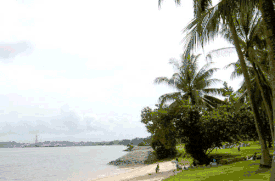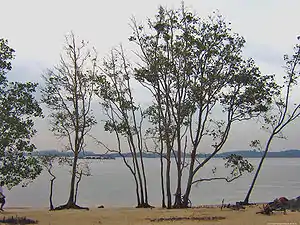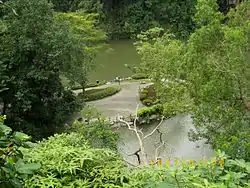Pasir Ris Park
Pasir Ris Park (Chinese: 白沙公园; Malay: Taman Pasir Ris) is a beach park located in the eastern part of Singapore. It covers an area of 70 hectares (170 acres), and was partially built on reclaimed land. Initially planned in the late 1970s to serve people living in the vicinity, the park was designed with the help of two Japanese landscape specialists. Construction began on the park in September 1984, and the park was opened in phases from August 1986 to 1991. The park was further expanded in 2007, with the addition of new areas such as a herb garden.
| Pasir Ris Park | |
|---|---|
 Sea view from Pasir Ris Park | |
.svg.png.webp) | |
| Type | Coastal Park |
| Location | Pasir Ris, Singapore |
| Coordinates | 01°22′53.34″N 103°57′3.24″E |
| Area | 70 hectares (700,000 m2) |
| Opened | 1986 |
| Managed by | National Parks Board |
| Status | Open |
The park contains campsites, cycling paths, various gardens and barbeque pits. In addition, the park also has a 5.0 hectares (12 acres) mangrove area with a boardwalk.
Description

Pasir Ris Park covers an area of 70 hectares (170 acres), and is around 3.2 kilometres (2.0 mi) long. It is bordered by Pasir Ris Road and Jalan Loyang Besar to the south, and faces the sea to the north. The park is divided into four areas, numbered from east to west. These areas are Area 1, east of the Sungei Tampines, Area 2, between the Sungei Tampines and the Sungei Api Api, and Areas 3 and 4, which are west of the Sungei Api Api.[1]
History
Initial plans
Plans for Pasir Ris Park were first announced in April 1978, with the park intended to serve nearby residents.[2] Initial plans for the park included a large pond, jogging and cycling paths, tree groves and a sports complex. Moreover, two Japanese landscape specialists were roped in to assist in the park's design.[3]
Construction
The purchase of land for the park had begun earlier in November 1977, and further land purchases were made in 1983. In addition, 44 hectares (110 acres) of land was reclaimed for the sea.[4] Plans for the park were finalised in 1983.[5]
During the construction of Pasir Ris Park, a portion of the beach was raised to eliminate waterlogged soil. To contrast with the flat terrain of the area, earthworks were carried out to create an undulating landscape within the park, and a portion of mangrove swamp at the park's Loyang end was also kept. In December 1984, the Parks and Recreation Department announced that the park would be opened in three stages, each related to the three themes chosen for the park, "Children's Holiday", "Saturday Afternoon" and "Fair Weather Sunday". Of these three themes, construction for the 20 hectares (49 acres) area for "Children's Holiday" had started in September 1984.[6]
The first stage of the park was officially opened on 23 August 1986.[7] This section, based around the theme of "Children's Holiday", was built at a cost of S$500,000, and was intended for children of different age groups, with different types of equipment for each age group.[8] Before the official opening, the park had already attracted crowds, especially children.[9] Work on the 32 hectares (79 acres) Fair Weather Sunday began in 1988.[10] This area, intended for less strenous activities like strolling,[8] included a lookout point, facilities for picnickers, as well as a mangrove area with wooden boardwalks.[10] Additional facilities, such as a maze, were added to the park by the end of the 1980s and Phase 4, a 7.7 hectares (19 acres) area for large gatherings at the park's western end, was completed by November 1991.[11]
Landscape and facilities
The facilities at the park include barbeque pits and dining establishments, along with dedicated facilities for cycling and water sports. In addition, there are selected areas for camping, and gardens with culinary and flowering plants.[14]
Mangroves
During the park's construction, 5 hectares (12 acres) of mangrove was preserved, and another hectare was added in 1989. The mangroves have raised wooden walkways for visitors, along with signage with information on mangrove wildlife. The mangrove has a large number of tree species, ranging from the more common to the endangered.[15] The mangrove area also has a 3-storey tower intended for bird-watching.[16]
References
- "Park Map". nparks.gov.sg. NParks. Retrieved 27 May 2020.
- "W. Coast residents to have $1 million park". The Straits Times. Singapore. 17 April 1978. p. 9. Retrieved 27 May 2020 – via NewspaperSG.
- "2 Japanese help in park design". New Nation. Singapore. 28 June 1978. p. 2. Retrieved 27 May 2020 – via NewspaperSG.
- "100-hectare public park being planned". The Straits Times. Singapore. 5 January 1983. p. 11. Retrieved 27 May 2020 – via NewspaperSG.
- "Botanies extension will have a tree garden". The Straits Times. Singapore. 2 April 1983. p. 10. Retrieved 27 May 2020 – via NewspaperSG.
- Conceicao, Robert (6 December 1984). "S'pore's next biggest park coming up A place to sweat it out or take it easy". Singapore Monitor - 2nd Edition. Singapore. p. 1. Retrieved 27 May 2020 – via NewspaperSG.
- "Pasir Ris Park opens". The Straits Times. Singapore. 24 August 1986. p. 14. Retrieved 28 May 2020 – via NewspaperSG.
- Tan, Judy (24 October 1985). "Pasir Ris Park opens next year". The Straits Times. 24 October 1985. Retrieved 28 May 2020 – via NewspaperSG.CS1 maint: location (link)
- Wee, Beng Huat (19 August 1986). "Holiday crowd flocks to Pasir Ris playground". The Straits Times. Singapore. p. 10. Retrieved 28 May 2020 – via NewspaperSG.
- Ng, Irene (21 November 1987). "Mangrove swamp stroll a new Pasir Ris attraction". The Straits Times. Singapore. p. 1. Retrieved 28 May 2020 – via NewspaperSG.
- Lam, Jenny (21 December 1989). "People's parks". The Straits Times. Singapore. p. 1. Retrieved 28 May 2020 – via NewspaperSG.
- Chew, Seng Kim (22 March 2008). "Pasir Ris park gets makeover". The Straits Times. Singapore. p. 40.
- "Pasir Ris Park". nparks.sg. NParks. 10 July 2008. Retrieved 28 May 2020.
- "Your Guide To Pasir Ris Park" (PDF). nparks.gov.sg. NParks. Retrieved 2 July 2020.
- Ng, Peter KL; Sivasothi, N. "mangroves in singapore to visit: pasir ris park". mangrove.nus.edu.sg. Retrieved 28 May 2020.
- "What to see - Pasir Ris Park". nparks.gov.sg. National Parks Board. Retrieved 20 November 2020.
